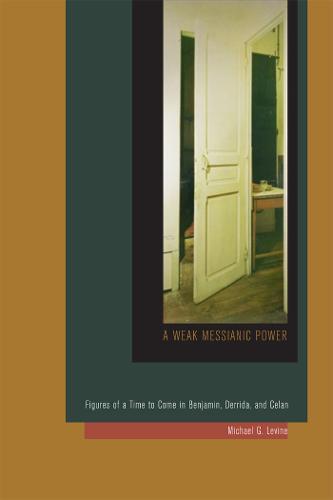Overview
In his famous theses on the philosophy of history, Benjamin writes: “We have been endowed with a weak messianic power to which the past has a claim.” This claim addresses us not just from the past but from what will have belonged to it only as a missed possibility and unrealized potential. For Benajmin, as for Celan and Derrida, what has never been actualized remains with us, not as a lingering echo but as a secretly insistent appeal. Because such appeals do not pass through normal channels of communication, they require a special attunement, perhaps even a mode of unconscious receptivity. Levine examines the ways in which this attunement is cultivated in Benjamin’s philosophical, autobiographical, and photohistorical writings; Celan’s poetry and poetological addresses; and Derrida’s writings on Celan.
Full Product Details
Author: Michael G. Levine
Publisher: Fordham University Press
Imprint: Fordham University Press
Dimensions:
Width: 15.20cm
, Height: 2.30cm
, Length: 22.90cm
Weight: 0.341kg
ISBN: 9780823255108
ISBN 10: 0823255107
Pages: 192
Publication Date: 11 November 2013
Audience:
Professional and scholarly
,
Professional & Vocational
Format: Hardback
Publisher's Status: Active
Availability: In Print

This item will be ordered in for you from one of our suppliers. Upon receipt, we will promptly dispatch it out to you. For in store availability, please contact us.
Reviews
The readings in A Weak Messianic Power are subtle and full of unexpected turns, and many are tours de force acts of deconstruction. Levine reads over, almost over the shoulder of, great critical readers, Derrida, Celan, Benjamin, exposing in their writing a wealth of images not apparent to the naked eye. The method is almost astronomical: it brings near the distant contours of a strange temporal figure-a non-homogenous, surprising time. The book offers a strong notion of messianism outside theology, the messianism of the small alteration. -Paul North, Yale University
GCGBPThe readings in A Weak Messianic Power are subtle and full of unexpected turns, and many are tours de force acts of deconstruction. Levine reads over, almost over the shoulder of, great critical readers, Derrida, Celan, Benjamin, exposing in their writing a wealth of images not apparent to the naked eye. The method is almost astronomical: it brings near the distant contours of a strange temporal figureGCoa non-homogenous, surprising time. The book offers a strong notion of messianism outside theology, the messianism of the small alteration.GC[yen] GCoPaul North, Yale University
The readings in A Weak Messianic Power are subtle and full of unexpected turns, and many are tours de force acts of deconstruction. Levine reads over, almost over the shoulder of, great critical readers, Derrida, Celan, Benjamin, exposing in their writing a wealth of images not apparent to the naked eye. The method is almost astronomical: it brings near the distant contours of a strange temporal figure-a non-homogenous, surprising time. The book offers a strong notion of messianism outside theology, the messianism of the small alteration. ----Paul North, Yale University
Author Information
Michael G. Levine is Professor of German and Comparative Literature at Rutgers University. He is the author of Belated Witness: Literature, Testimony, and the Question of Holocaust Survival.




